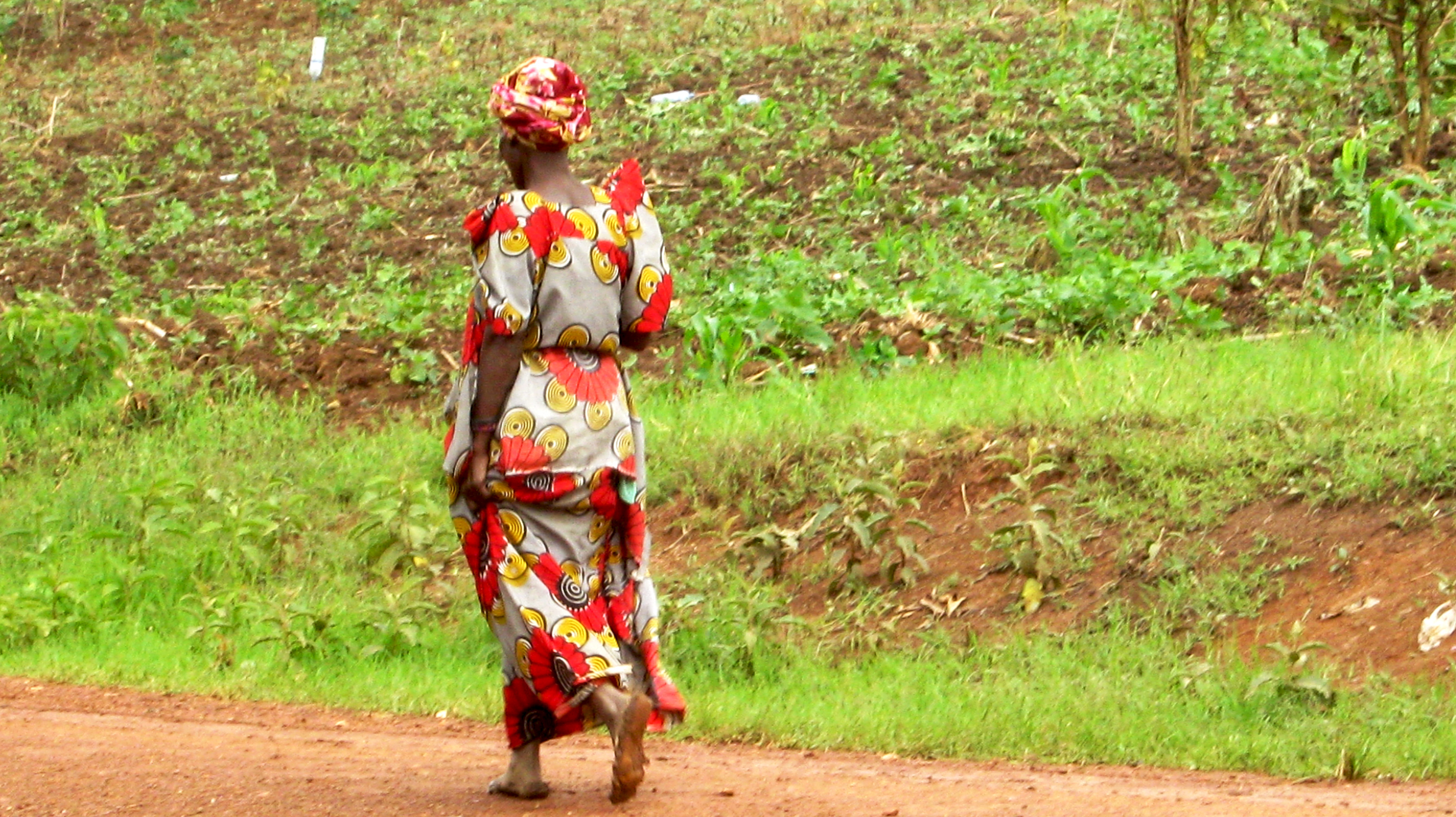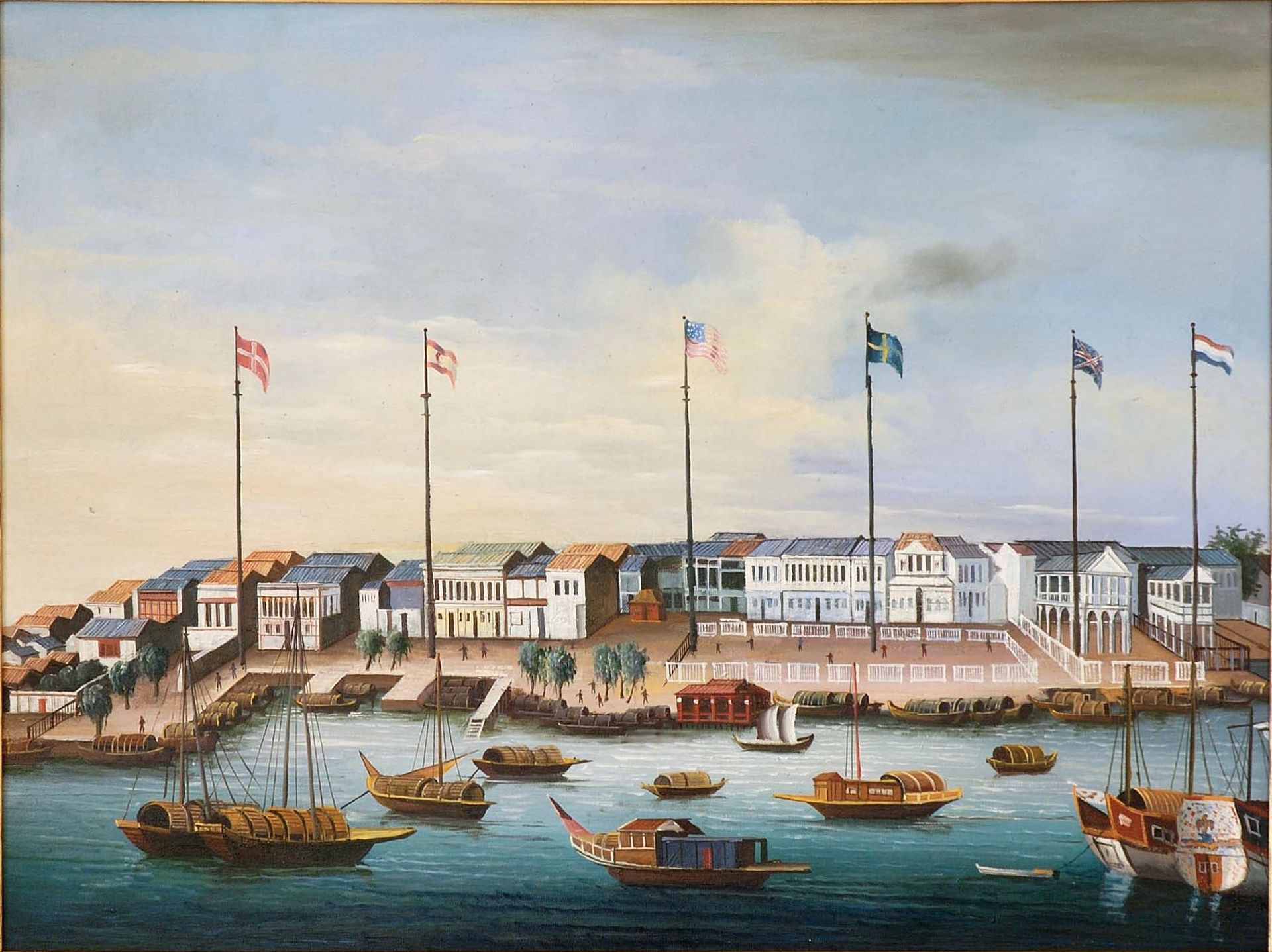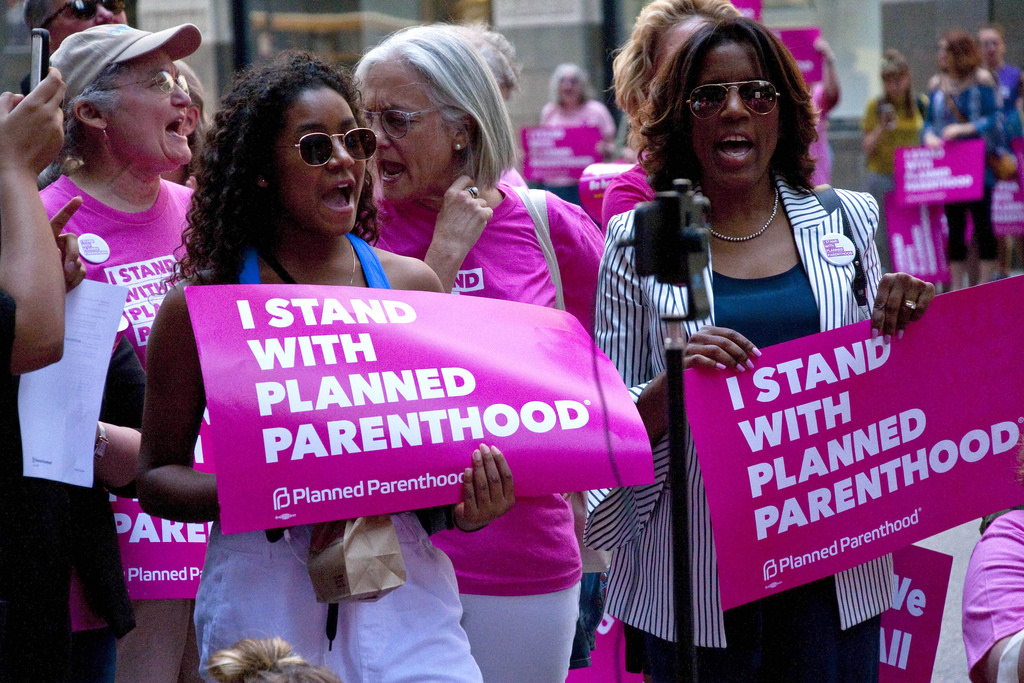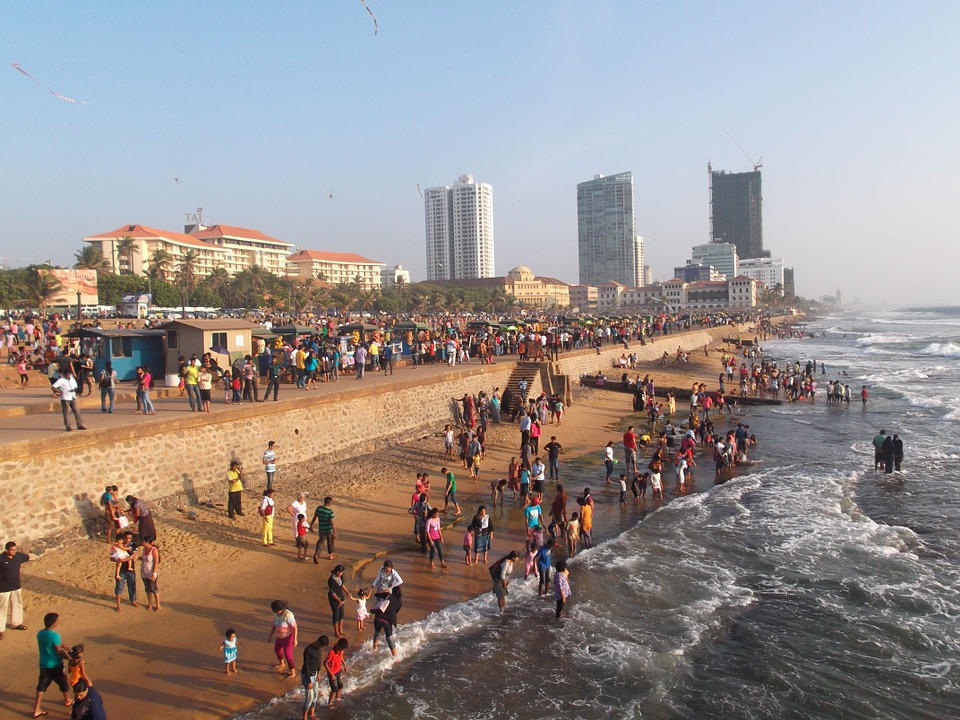Felipe Daniel Gutierrez Alvarez, Chilean-french student on the MSc Development Studies programme, explains why so many young people in his home country of Chile are protesting.
What is happening in Chile right now? Why is there such a huge outbreak in one of the most stable, until now, countries in Latin America? These are some of the main questions that I will try to answer in this post. It aims to give a quick overview to understand the causes that promoted the major social outbreak in Chilean history. I would like to emphasizes that this is a quick overview since each politics, economics, cultural and social spheres, among others, need a deeper analysis than a blog would allow us. However, it is a great starting point to be familiarized with this outbreak.
First, I will give an overview about the Chilean historical context that created this model that generated this social outbreak. Then, I will relate how the movement itself started, by describing the direct cause, and the repression ordered by President Sebastian Piñera, with observed violations of human rights.
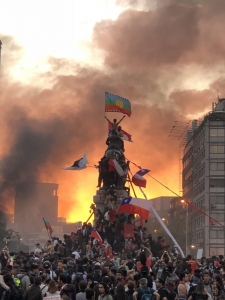
Origin of the Neoliberal Chilean Model
To understand the present and actual system of Chile, we need to go back to the 70s. It may seem a bit surprising to go back in the 70s to explain something in 2019, nevertheless, it is needed to review how the “Chilean model” was created. In 1970 Salvador Allende was elected President of the Republic, by democratic elections, and the first elected president in the world to be declared Marxist. His government started huge reforms in economic, politics and social spheres. After three years of government that ended with a political-economic crisis (generated by internal, such as great opposition of the dominant class, and external factors, such as the US intervention[1]), on the 11th September, 1973, a coup was held by the Chilean Army, headed by Augusto Pinochet, starting a brutal Dictatorship that lasted 17 years. A neoliberal counterrevolution was put in place, leaded by the “Chicago Boy’s”[2], with structural changes alongside a new Constitution imposed in 1980.
The idea, behind this Constitution, was to implement a series of rules where the possibility of changes (the rules and/or core of the model) was so difficult, that whoever was ruling was constraint to keep the neoliberal system intact. The subsequent democratic Governments after the end of the Dictatorship, in 1990, were constrained to follow these rules and had limited possibilities for social changes, when governments wanted to make changes.
This can be seen as a big deviation, but it is important to keep this in mind because the actual system is designed to maintain a permanent “status quo” where the cost was the disconnection between political institutions and social sphere. A part of the social discontent is due by the idea, justify sometimes, that “it doesn’t matter to vote, they are all the same”. It is reinforced by the incapacity (or negation) of the political institutions to transform the social demands into changes. There was plenty of demonstrations and protests before the one we are spectating today, among them the most important were the education related demonstrations in 2001, 2006 (called the “Penguin Revolution”[3]), 2011 and 2016.
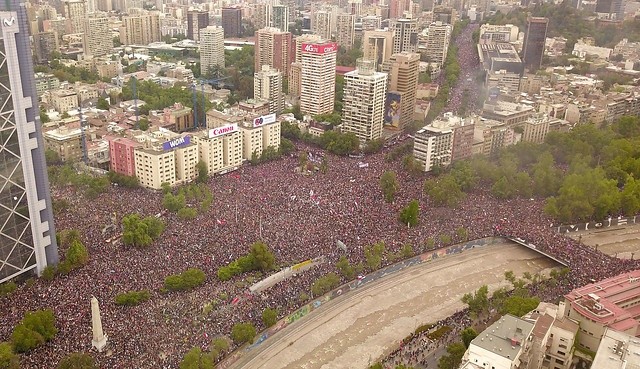
The social outbreak
So, what about the current outbreak? It started in October earlier this year, and escalated very quick. The “spark” started on the 6th of October, when an increase in the fare of public transport was implemented and contested, because of the high cost of living. By the 14th of October, some secondary students (a few groups) started to protest by jumping over the turnstile’s subways in order to avoid paying. Police riot-control were sent to repress them by using excessive force, incrementing the discontent into the public opinion against the Government and how they were handling the protests. More and more students joined the protests, and more policemen were sent, starting an escalade of violence. By 18th of October, considered the starting point, riots were generalized all over the city of Santiago and barricades were sets. On the 19th of October, the President Sebastian Piñera ordered a “State of Emergency”, sent the army on the street and imposed a curfew. He then stated in an allocution on the 20th of October that “We are at war against a powerful enemy […]”.
It is interesting to notice that just 3 days before this, the President Piñera said that Chile was “[…] an oasis”. On the 25th of October, the major meeting in Chilean history took place in Santiago where more than 1,2 million people took to the streets to protest.
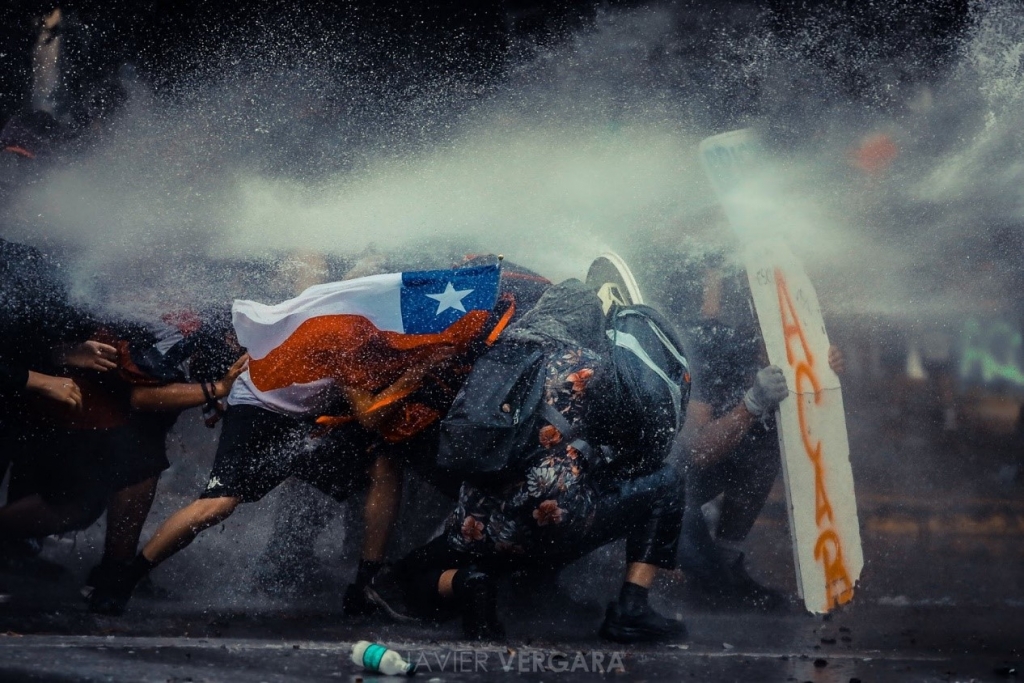
What started as a protest, against the increase of public transport fare, lead by few students located in Santiago, quickly turned into a national social outbreak against the Government, political institutions, the model of development and the system in general.
Human rights violations and deficient political reaction
The protests still continue to this day. The repression included violations of Human Rights, as stated by Amnesty International, Human Right Watch and the National Institute of Human Rights. At the moment, since the start of the riots, there has been registered: 23 deaths, 2,800 injured, 232 people with eye injuries, 2,670 criminal investigation related to human rights violations and 17,434 people charged. About the eye injuries, the New-York Times covered this situation with this video (in English).
In the Parliament, a Constitutional Accusation is in process of discussions against the President, Sebastian Piñera, and the former Ministry of Interior, Andres Chadwick, for their responsibilities in Human Rights violations. The Government, with an approval of 4,6%, is more focused on criminalizing the movement (with new laws) than giving real solutions for the social problems and inequalities, such as: deficient coverage of public health, low pensions for the retired, low incomes, high costs of education (every levels) and impunity in notorious case of corruption and fraud, among others.
On the 14th of November, a broad political agreement in the Parliament accorded to make a referendum that will be held in April 2020 to ask the people if they are willing to have a new Constitution (yes/no) and how this new Constitution should be created (by 100% of delegates elected for this only purposes – or- by 50% of the delegates elected and the other 50% by congressmen in exercise). However, this agreement has some external and internal flaws due to the feeling of the people that this agreement was made without them (distrust against politicians in general), and the extreme right-wing that are willing to keep this model without changes.
At the moment, no solution or proposal aiming to solve the roots of this social outbreak has been given. They will try everything to defend this neoliberal model. If you ask why they don’t make the changes, you must keep in mind that the dominant class do not have the intention in giving up a model that fits and defends their interest. The Government are applying the same strategies used before against social movements: criminalize the movement, give few social benefits that neither solve the problem nor change the model, stress the political agreements to inhibit changes, creation of laws that restrict the right of protest and wait for people to get tired.
Conclusion
I hope that this blog can be useful as a starting point to discuss what is actually happening in Chile. There are a lot of situations that I’m not discussing but I would like to mention such as: the greats feminists demonstrations made during the protests (see “Las Tesis”); this outbreak are also showing cultural and social changes, for example, protesters started to call the “Plaza Italia” (“Italy Square” in Spanish) as “Plaza de la Dignidad” (“Dignity Square”, people see the changes asked as a way to recover dignity); the repeated destruction of monuments all over the country that honors Spanish conquerors and the massive use given to the Mapuche’s flag[4]. This outbreak is against economic inequalities, the Government and political institutions in general. This outbreak doesn’t have, at the moment, neither an organization or structure, thus, there is not a figure to negotiate or discuss with. At the moment, it is very hard to see where this outbreak will decant, the political and social arena changes after every days or week, so the situation could dramatically change the next week. But something is certain: the people have changed and the Government will try everything in order to maintain the neoliberal model. Everything is being put in question and it has been demonstrated that neoliberalism works through repression and use of force.
If the reader is interested in hearing different views, I strongly advise you to follow the “Chilean Society” from LSE that organize some open conversation [5]and encounters. It is a great opportunity to see different views and chat with other Chilean students.
[1] https://www.intelligence.senate.gov/sites/default/files/94chile.pdf “United States Senate Select Committee to Study Governmental Operations with Respect to Intelligence Activities”, also known as “Committee Church”, was an U.S. Senate Committee created in 1975 in charge of investigate possible abuses made by U.S. Intelligences related agencies.
[2] The “Chicago Boys” are a group of Chilean neoliberal economist formed in the University of Chicago under the supervision of Milton Friedman. If you are more interested, you can search for a documentary made in 2015 called “Chicago Boys”.
[3] Called “Penguin Revolution” due by the similarity in colors used by secondary students uniform and the penguin.
[4] The Mapuche are historically the most important (by quantity) ethnic groups of native American in Chile.
[5] I would like to thanks Profesor James Putzel that accepted an invitation o participate in one of this meetings.
[3] Called “Penguin Revolution” due by the similarity in colors used by secondary students uniform and the penguin.
Felipe Daniel Gutierrez Alvarez is a Chilean-french student on the MSc Development Studies programme. He has a BSc in Public Administration from the University of Santiago of Chile (USACH) and has worked as an intern at the United Nations Economic Commission for Latin America and the Caribbean (ECLAC), a teaching assistant in his former alma mater, and as a former Officer at the Ministry of Social Development of Chile.
The views expressed in this post are those of the author and in no way reflect those of the International Development LSE blog or the London School of Economics and Political Science.


